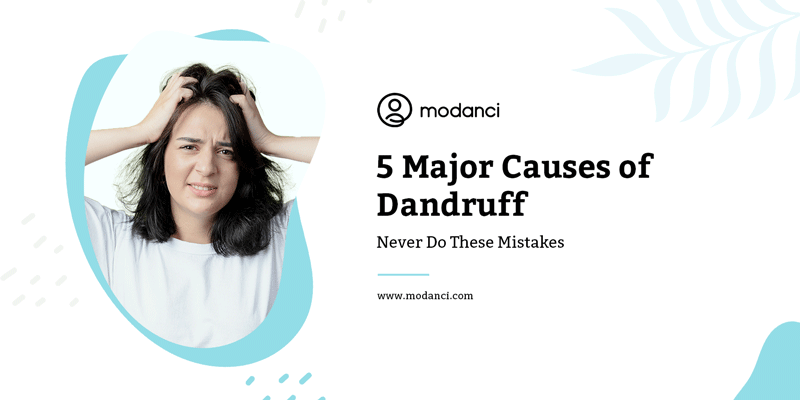When it comes to dandruff, understanding the underlying causes is crucial in effectively managing and preventing this common scalp condition. Some mistakes need to avoid, from the overgrowth of yeast-like fungus to improper hair care practices.
Also, explore the factors that contribute to dandruff formation. Gaining insight into these causes helps to make confident choices to maintain a healthy scalp and bid farewell to those pesky white flakes. Dandruff, the frustrating intruder in your hair care routine, can dampen your spirits and leave you self-conscious. These white specks can be a frustrating challenge to tackle.
However, there is nothing to be scared! Get ready to reclaim a flake-free scalp and regain your confidence! In this blog, we delve into the five major causes of dandruff and unveil the mistakes you should never make if you’re determined to bid farewell to those irritating flakes.
What is Dandruff?
Dandruff is a common scalp condition characterized by the shedding of dead skin cells from the scalp. It often leads to the formation of visible white or yellowish flakes that may be accompanied by itching and irritation. Dandruff can be caused by various factors, including excessive oil production, a yeast-like fungus called Malassezia, dry skin, sensitivity to hair care products, and certain medical conditions.
While it is not a serious health concern, dandruff can be persistent and bothersome, affecting one’s self-esteem and confidence. Effective management and treatment options are available to help reduce the symptoms and keep dandruff under control.
Five Major Mistakes That Cause Dandruff
From inadequate scalp hygiene to using harsh hair products, these mistakes can disrupt the scalp’s delicate balance and pave the way for those unwanted white flakes. Understanding these pitfalls allows you to make informed choices and journey towards a flake-free, confident scalp.
Here are five major mistakes to avoid that can cause dandruff:
1. Inadequate Scalp Hygiene
Inadequate scalp hygiene refers to practices that do not effectively cleanse or maintain the cleanliness of the scalp. When the scalp is not cleaned correctly, dirt, oil, sweat, dead skin cells, and product buildup can accumulate over time. This buildup creates an environment where the yeast-like fungus Malassezia, associated with dandruff, can thrive.
To maintain adequate scalp hygiene, washing your hair regularly with a mild shampoo suitable for your hair type is generally recommended. Paying attention to proper washing techniques, rinsing thoroughly, and avoiding sharing personal hair care items can all contribute to a cleaner and healthier scalp, reducing the likelihood of dandruff.
2. Excessive Shampooing
Excessive shampooing refers to washing the hair and scalp more frequently than necessary. While maintaining scalp hygiene is important, overdoing it with shampooing can have some drawbacks and potentially contribute to dandruff.
Shampoos contain surfactants that help remove dirt, oil, and product buildup from the hair and scalp. However, excessive shampooing can lead to the removal of too much natural oil (sebum) produced by the scalp. Sebum helps to moisturize and protect the scalp, and its excessive removal can result in dryness and flakiness.
Frequent exposure to strong cleansing agents in shampoos, especially those containing harsh chemicals or sulfates, can cause scalp irritation and inflammation. This irritation can disrupt the scalp’s natural defense mechanisms and contribute to dandruff.
It’s important to find a balance when it comes to shampooing. The optimal shampooing frequency varies for each person, depending on their hair type, scalp condition, and personal preferences. If you notice that frequent shampooing is causing scalp issues or dandruff, reducing the frequency, using milder shampoos, or exploring alternative cleansing methods may be beneficial.
3. Using Harsh Hair Products
Harsh hair products often contain chemicals like sulfates, parabens, synthetic fragrances, and alcohol. These ingredients can irritate the scalp, leading to dryness, redness, and inflammation. They can also strip away the natural oils from the scalp, resulting in dryness. Some harsh hair products, like styling gels, waxes, or sprays, can leave residue and buildup on the scalp. This buildup can clog the hair follicles and hinder the scalp’s natural shedding process. All these factors can lead to the formation of a dry and irritable scalp, leading to dandruff.
To avoid the adverse effects of harsh hair products on the scalp, consider opting for milder and more gentle formulations. Look for shampoos and conditioners specifically designed for sensitive scalps or labeled sulfate-free, paraben-free, and fragrance-free.
Natural and organic hair care products can also be a good option as they often contain fewer harsh chemicals. Regularly clarifying the scalp to remove product buildup and ensuring thorough rinsing after using hair products can help maintain a healthy scalp environment.
4. Ignoring Moisturisation
Ignoring moisturization can lead to a dry scalp, which is more prone to flaking and dandruff. The lack of moisture can cause the skin on the scalp to become dry, tight, and itchy, resulting in visible white or yellowish flakes. A dry scalp is often more sensitive and prone to irritation. Ignoring moisturization can exacerbate this sensitivity, leading to discomfort, redness, and inflammation.
Moisturization is crucial in maintaining a healthy balance of the scalp’s natural oils. Ignoring moisturization can lead to an imbalance, where the scalp becomes too dry or oily. Both extremes can contribute to dandruff formation. Proper moisturization nourishes the scalp, promotes cell turnover, and supports overall scalp health. Neglecting it can weaken the scalp’s defenses, making it more susceptible to dandruff-causing factors like yeast overgrowth or environmental irritants.
Consider using scalp-friendly moisturizers or oils specifically formulated for the scalp. Look for ingredients like aloe vera, jojoba oil, argan oil, or tea tree oil, known for their moisturizing and soothing properties. Apply a small amount of moisturizer or oil to the scalp and gently massage it to help nourish and hydrate the skin. Regular moisturization can help maintain a healthy moisture balance, reduce dryness, and minimize the risk of dandruff.
5. Stress and Poor Lifestyle Habits
Chronic stress and poor lifestyle habits can weaken the immune system, making the body more susceptible to various health issues, including scalp conditions like dandruff. A weakened immune system may struggle to regulate the scalp’s natural balance effectively, allowing dandruff-causing factors to thrive. It can also disrupt the normal hormonal balance in the body, affecting the scalp’s health.
Unhealthy eating habits, such as a diet high in processed foods, sugar, and unhealthy fats, can negatively impact the scalp’s health. Poor nutrition can lead to nutrient deficiencies that affect scalp health and contribute to dandruff. Inadequate sleep or poor sleep quality can disrupt the body’s natural processes, including skin cell turnover and repair, weakening the scalp’s defenses.
Similarly, excessive alcohol consumption can dehydrate the body, including the scalp, leading to dryness and flaking. Smoking tobacco can have detrimental effects on overall health, including scalp health. It can reduce blood flow to the scalp, impair healing, and contribute to dryness and flakiness.
It is important to prioritize self-care and healthy practices. Manage stress through relaxation techniques, exercise, and activities that promote well-being. Adopt a balanced and nutritious diet that supports scalp health and includes fruits, vegetables, lean proteins, and healthy fats. Limit alcohol consumption and consider moderating or quitting smoking. Get sufficient sleep and establish a consistent sleep routine. You can also massage your scalp to stimulate blood flow and promote a healthy scalp environment.
Conclusion
Maintaining a healthy scalp and minimizing the occurrence of dandruff involves a holistic approach that considers various factors. By understanding the causes and mistakes contributing to dandruff, we can take proactive steps towards a healthier scalp. By embracing the abovementioned practices, we can maintain a balanced scalp environment, support the scalp’s natural defenses, and reduce the risk of dandruff.
Remember, everyone’s scalp is unique, so it may take trial and error to find the best routine for you. Let’s prioritize scalp care, embrace healthier choices, and say goodbye to those pesky flakes. With a little effort and attention, we can reveal a healthier, dandruff-free scalp and confidently enjoy the beauty of our hair.
FAQs
1. How do you get rid of dandruff?
You can eliminate dandruff by maintaining adequate scalp hygiene, avoiding excessive shampooing, choosing gentler hair care products, moisturizing the scalp, managing stress, and adopting healthy lifestyle habits.
2. Does dandruff mean unhealthy?
Having dandruff does not necessarily mean that a person is unhealthy. Dandruff is a common scalp condition that affects many individuals at some point. It is often caused by excessive oil production, a yeast-like fungus called Malassezia, dry skin, sensitivity to hair care products, or certain medical conditions.
While dandruff is not a serious health concern, it can be persistent and bothersome, causing itching, flaking, and sometimes discomfort or embarrassment. Dandruff may impact a person’s self-esteem or confidence, but it does not indicate poor health.
3. What is the reason for dandruff?
Excessive oil production on the scalp, an overgrowth of a yeast-like fungus called Malassezia, dry skin, which can lead to flaking, sensitivity to certain hair care products or ingredients, and Certain medical conditions, such as seborrheic dermatitis or psoriasis are some of the reasons for dandruff.
4. Does stress cause dandruff?
Yes, stress can contribute to the development or worsening of dandruff. When a person is under stress, it can disrupt the body’s hormonal balance and weaken the immune system. This weakened immune response can make the scalp more susceptible to various factors contributing to dandruff, such as excessive oil production, yeast overgrowth, or inflammation.
While stress alone may not directly cause dandruff, it can be a contributing factor. Managing stress through relaxation techniques, exercise, maintaining a healthy lifestyle, and seeking support when needed can help reduce its impact on scalp health and dandruff.
Read More:




